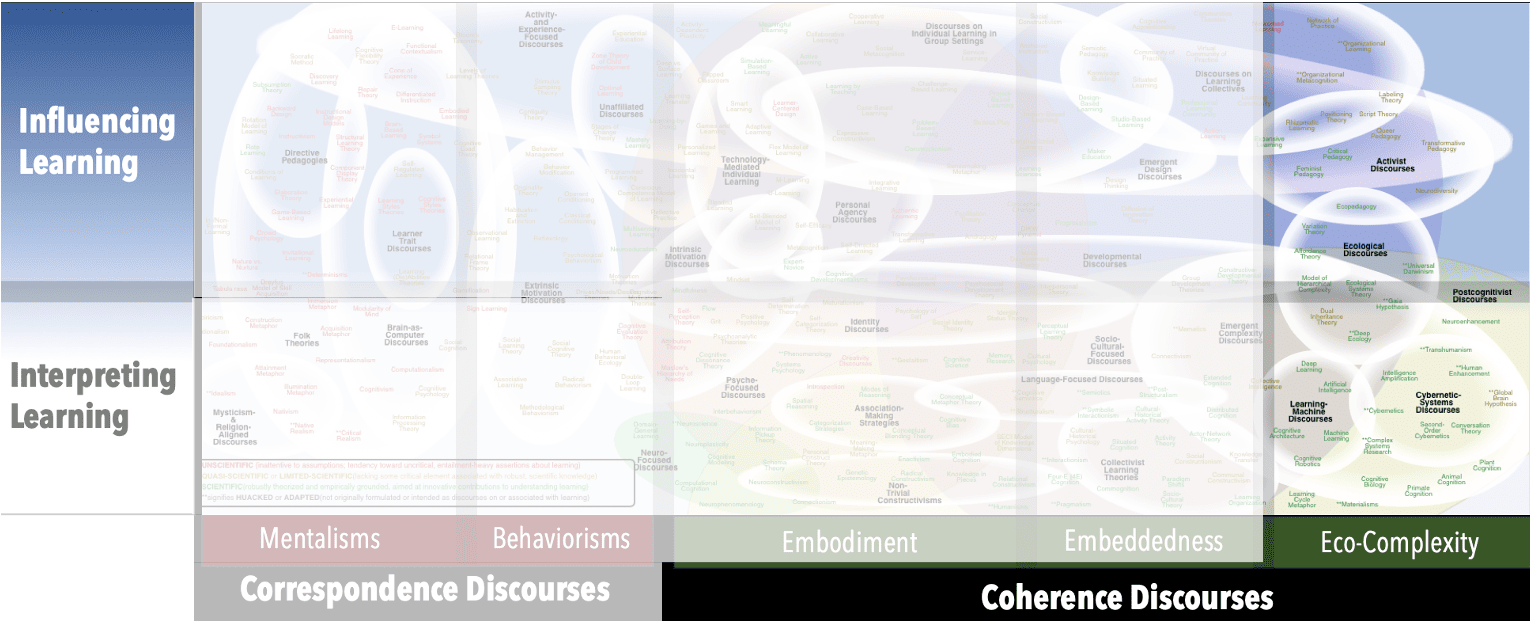Postcognitivist Discourses reject those discourses that frame cognition in terms of symbolic manipulation and information processing. Postcognitivist Discourses include a wide range of perspectives and foci, but they are united in at least two important grounding assumptions. Firstly, they invoke evolutionary dynamics to describe and explain learning. Secondly, all are compatible with Complex Systems Research.
Learn More...Complex Systems Research focuses on systems comprising sets of agents that form unified wholes in their interactions, relationships, or dependencies. Their emergent, global behaviors cannot be predicted on the basis of the rules governing the individual agents. Definitions and descriptions of complex systems revolve around such terms as emergent, adaptive, nonlinear, irreducible, noncompressible, non-decomposable, multi-level, self-organizing, context-sensitive, and adaptive.
Learn More...Ecology is the domain of science focused on the relationships of living things to their environments. As is frequently noted, the word is derived from the Greek for “house, dwelling place,” highlighting a simultaneous attentiveness to both the individual elements and to the system that comprises and transcends those elements. In education, proponents drawing on Ecological Discourses typically foreground multiple forms of relationship (e.g., biological, social, epistemological) while frequently situating discussions in relation to environmental well-being.
Learn More...Intersubjectivity refers to the perspective that human knowledge has to do with social accord, both implicit and explicit. Collective knowledge is seen to unfold from and be enfolded in individual knowing.
Learn More...Epistemology encompasses all discourses concerned with what knowledge is, its scope and limits, and how it is generated, validated, enacted, and maintained.
Learn More...Subjectivity-focused perspectives frame knowledge/knowing in terms of personal experience. Learning is seen an iterative dance of refining one’s web of interpretations to maintain coherence with one’s unfolding experiences.
Learn More...Focus
Perspectives on knowledge/knowing rooted in systems dynamics
Principal Metaphors
- Knowledge is … the space of current possibility
- Knowing is … system-maintaining activity
- Learner is … a self-maintaining (eco)system
- Learning is … adapting; co-evolving; self-maintaining
- Teaching is … co-evolving
Rise to Prominence
late-1900s (in formal education)
Synopsis
Interobjectivity is a perspective on knowledge and reality that underscores the mutually affective relationships between phenomena and knowledge of phenomena. In interobjective terms, knowing is doing is being. That is, knowledge of the world – knowing – exists in agents’ actions and interactions with/in the systems that comprise them. Knowing is embodied and embedded in the ever-unfolding choreography of co-action.
Commentary
Most discourses on knowledge and knowing that arose over the past few centuries are indexed to humanity. Those associated with Subjectivity typically frame knowledge and knowing in terms of individual human experience, and those associated with Intersubjectivity in terms of human collectivity. The notion of Interobjectivity expands the conversation in both directions, inviting critical examinations of such assumed separations as human from non-human and animate from inanimate. On these counts, Interobjectivity collects some emergent western sensibilities – in particular, Postcognitivist Discourses, Ecological Discourses, and Complex Systems Research – while aligning with many Indigenous Epistemologies (under Epistemology).
Map Location

Please cite this article as:
Davis, B., & Francis, K. (2024). “Interobjectivity” in Discourses on Learning in Education. https://learningdiscourses.com.
⇦ Back to Map
⇦ Back to List

